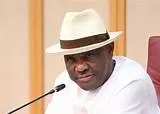
No one is above the law. The recent allegations against the Minister of the Federal Capital Territory (FCT), Nyesom Wike, over asset concealment, illicit enrichment, and potential violations of Nigeria’s asset declaration laws must be treated with the seriousness they deserve. The Economic and Financial Crimes Commission (EFCC) and other anti-graft institutions must act decisively and impartially. Anything less would betray public trust and deepen the country’s image crisis before the international community.
Credible investigations, including those published by SaharaReporters and other reputable platforms, have revealed troubling details linking Wike, his spouse, Justice Eberechi Suzzette Nyesom-Wike, and their children to multiple high-value lakeside properties in Winter Springs, Seminole County, Florida. These properties were allegedly acquired between 2021 and 2023 through shell companies and cash transfers, reportedly without adequate disclosure to the Code of Conduct Bureau (CCB).
Equally disturbing are allegations that $300 million earmarked for the environmental remediation of Ogoniland, funds intended to repair decades of ecological devastation in the Niger Delta, were diverted into private retail ventures. If substantiated, this would amount to one of the most egregious acts of betrayal of public trust in Nigeria’s recent history.
These claims go beyond idle speculation. They strike at the heart of Nigeria’s integrity, exposing potential breaches of local and international anti-corruption laws, as well as money-laundering regulations in the United States. They raise serious questions about ethical governance, transparency, and accountability at the highest levels of public office.
As a forensics expert, I believe this case provides a clear opportunity for the EFCC and CCB to demonstrate impartiality and technical competence. The investigation must begin with a full audit of all asset declarations submitted by Wike during his tenure as governor of Rivers State and as minister. Those records should be compared against property registries, land allocations, and bank transactions both in Nigeria and abroad.
International cooperation is key. The EFCC should activate the Mutual Legal Assistance Treaty between Nigeria and the United States to obtain certified property and banking records from Florida authorities. Such collaboration is critical to verify ownership, funding sources, and whether purchases were made through legitimate income streams or illicit channels.
A robust forensic accounting review must also be undertaken. Financial statements, tax filings, and transfer records should be scrutinised to uncover hidden flows of money and detect any attempt to disguise illicit assets. This should be complemented by a detailed review of corporate registries to trace beneficial ownership, particularly where assets were transferred to children or family members through shell companies or proxies.
Transparency is equally vital. Anti-corruption agencies must maintain public confidence by providing periodic updates on the progress of the investigation. Nigerians have a right to know whether the allegations are substantiated and what steps are being taken to hold those responsible to account.
We have precedents in Nigeria where thorough forensic investigations yielded results. The EFCC’s recovery of over $500 million in proceeds of crime in a single year and the forensic audit of the Niger Delta Development Commission (NDDC), which exposed ghost projects and fraudulent payments, demonstrate that competent forensic work can uncover hidden corruption networks. These same principles must now be applied to the Wike case.
If the Ogoni remediation funds were indeed diverted, the implications extend far beyond national embarrassment. It would signify a profound moral failure and a breach of faith with the very communities whose suffering these funds were meant to alleviate. It would also send a damning message to international partners that Nigeria lacks the political will to police its own corruption.
This case represents a litmus test for Nigeria’s anti-corruption institutions. It will reveal whether the EFCC, the ICPC, and the CCB are truly independent or beholden to political influence. President Bola Tinubu must rise to the occasion by ensuring that the law takes its full course. He cannot afford to appear tolerant of impunity at a time when public confidence in governance is already waning.
The allegations against Wike are too numerous and too grave to ignore. The pattern, from foreign property purchases to opaque land allocations and alleged diversions of public funds, points to systemic abuse of office. Any administration serious about its credibility and reform agenda should see such conduct as a liability, not an asset.
If Nigeria is to restore faith in its institutions, this investigation must be pursued to its logical end.
 Premium News
Premium News